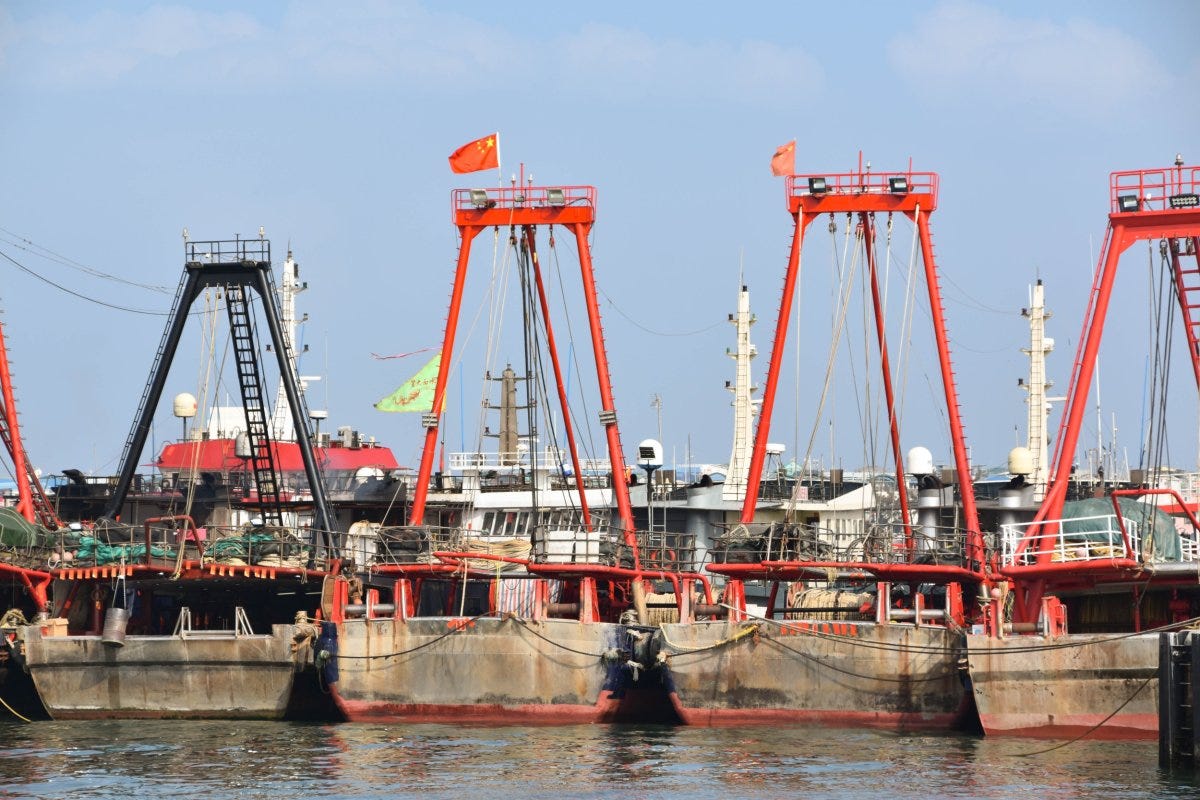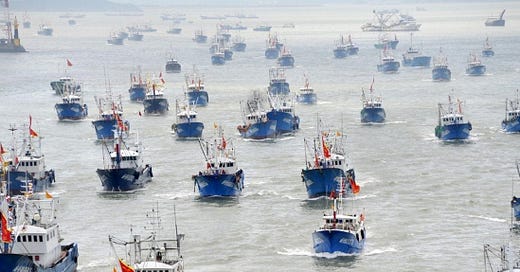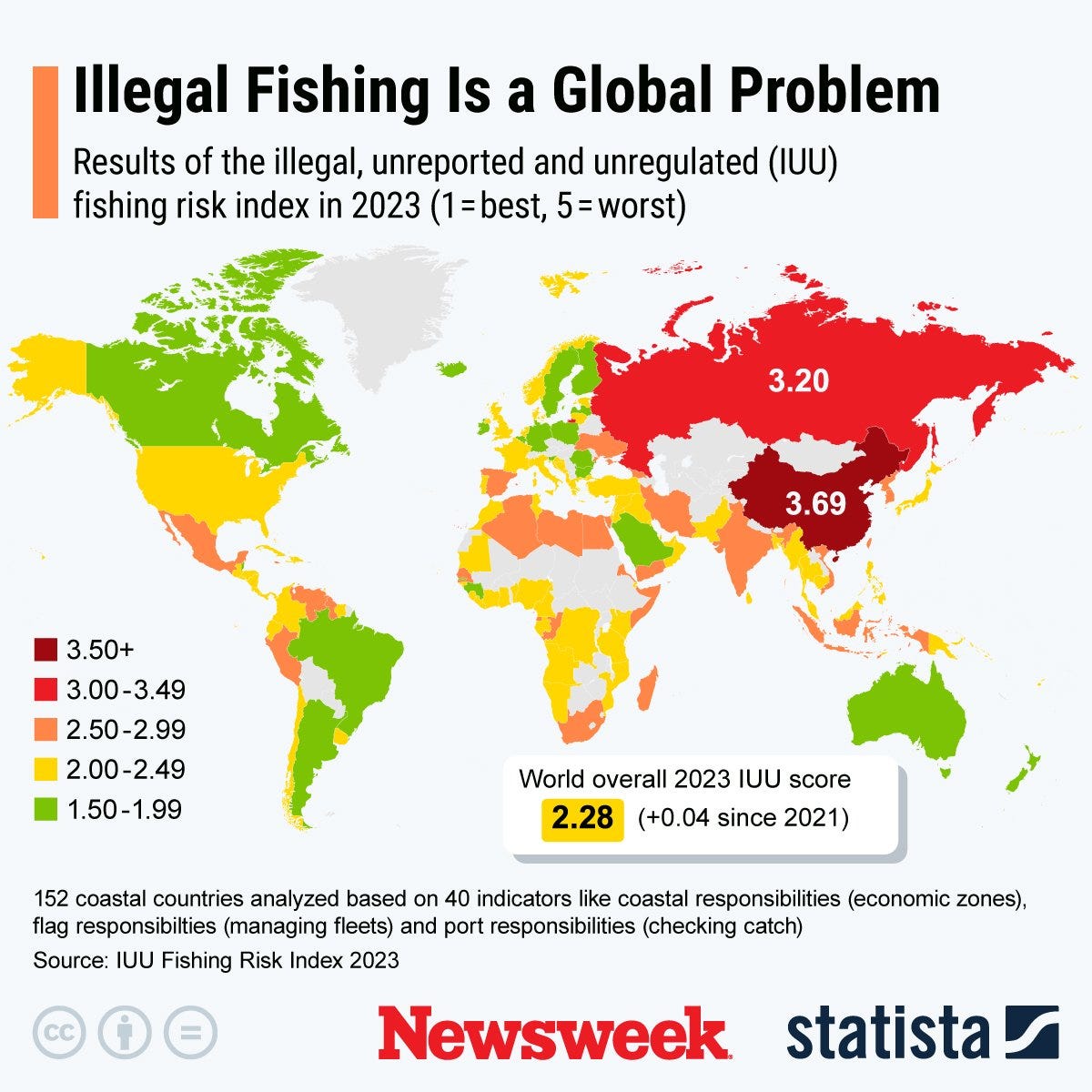China Dominates 'Dark' Network Behind Global Fishing Crisis
By Micah McCartney
A new report exposes the sophisticated networks propping up Chinese squid fleets accused of illegal fishing off South America.
These activities—often carried out with Automatic Identification System (AIS) trackers turned off, or "dark"—are undercutting local fishers who depend on regional marine resources for their livelihoods, according to Washington, D.C.-based nonprofit C4ADS.
Illegal, Unreported And Unregulated
The rising demand for seafood and dwindling local stocks have pushed fishing fleets farther from home. The vessels now operate in international waters for months—even years—at a time, virtually unmonitored, increasing the risk of illegal, unreported and unregulated (IUU) fishing and labor abuses.
China and Taiwan account for about 60 percent of distant-water fishing, and Chinese vessels in particular have faced growing scrutiny for allegedly operating illegally within South American exclusive economic zones, prompting rising grassroots pressure to tighten enforcement and close regulatory loopholes.
Newsweek reached out to the Chinese embassies in Paraguay and Uruguay with emailed requests for comment.

What To Know
The abundant stocks of jumbo flying squid and Argentine shortfin squid have attracted distant-water fishing fleets to the coasts of South America.
A report released Tuesday by the C4Dfound that 69 percent of squid jiggers operating off the Pacific and Atlantic coasts share ownership with ships allegedly involved in illicit activities, or vessels of concern.
While these operations are theoretically under the oversight of the South Pacific Regional Fisheries Management Organization (SPRFMO), enforcement is often spotty. The situation is even more tenuous on the Atlantic coast, which lacks a comparable fisheries management framework.
Monitoring these vessels is challenging because of extended periods between port calls. Complicating matters further are sophisticated networks of onshore and offshore actors who facilitate illicit operations by obscuring catch data, obfuscating labor abuses, and lobbying to maintain lax regulations, according to C4ADS.
Offshore Support
A variety of offshore support vessels is crucial to sustaining these industrial squid fishing operations over extended periods.
Refrigerated cargo ships, or "reefers," transfer catches, equipment, supplies and crew between vessels, allowing fishing ships to cut down on port visits, where they may be subject to inspections, and obscure the origin of hauls.
Reefers then typically offload catches at ports in states that are not party to the Port State Measures Agreement, a treaty aimed at blocking illegal fishing vessels from offloading their harvest.
Enforcement is further hindered by relatively lax regulations. Unlike other distant-water fishers restricted to interacting with SPRFMO-authorized vessels, squid jiggers are only required to report transshipments within 30 days and provide operational details quarterly.
Chinese firms have a significant presence in this sector. Nearly 90 percent of transshipment events involving distant-water squid jiggers were linked to Chinese-owned reefers, with just 15 ships accounting for 72 percent of these interactions.
All 15 operated under flags of convenience, registering under foreign nations in order to mask Chinese ownership and reduce oversight.
Tankers also play a key role by refueling these ships and allowing them to remain at sea for longer periods.
Unlike reefers, tankers are typically not required to report encounters with squid jiggers. Additionally, owners of tankers supplying fuel to squid fishers are not mandated to register these vessels within fleets that directly contact fishing vessels, creating a regulatory gap that enables support with a minimal record of activities.
Support vessels referred to as "floating offshore fishery bases" by C4ADS also bolster these operations. These are squid jiggers that have adopted multifunctional roles, providing logistics, operational coordination and limited medical care.
These ships not only extend time at sea but also help conceal labor abuses. While hospital ships have traditionally supported distant-water fishing, the report focuses on those registered solely as fishing vessels, whose activities extend beyond medical aid.
Onshore Support
While much of the squid fleet's activity plays out at sea, critical support also comes from land. Two key land-based sectors help sustain these operations, sometimes enabling illicit behavior in the process.
Port agents act as an important link between vessels and local authorities, managing logistics and relaying operational details. Yet the same access that facilitates oversight can also be used to shield questionable practices from government scrutiny, C4ADS wrote.
Insurance providers also play a role. Many underwrite high-risk vessels despite ties to IUU fishing, forced labor or sanctions violations—offering a financial cushion that helps these operations continue. Insurance claims themselves can sometimes offer a clearer picture of crew movement and health than data from vessel tracking systems, per the report.
A map provided by Statista showing the scale of illegal fishing globally. statista
What People Are Saying
Sara Nix, C4ADS natural resource security analyst, told Newsweek: "The distant water squid fleet relies on a global network of enablers, from port agents to tankers, that allow operations to continue largely unchecked.
"What's shifting the tide is growing grassroots pressure, especially in Peru and Argentina, where squid is vital to food security and local economies.
"As squid landings decline, whether due to climatic variations like El Niño, overfishing, or IUU activity, frustration is mounting. Local fishers and civic groups are increasingly demanding stronger oversight, not just of foreign vessels but of the opaque systems that enable them to operate with impunity."




